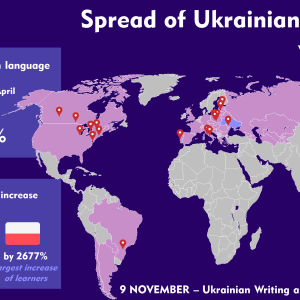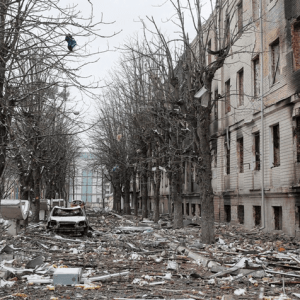Numerous Ukrainians were forced to flee the state as a result of the Russian invasion. In an attempt to escape the war, people left behind their relatives and native places with the sole purpose of survival. At the same time, a lot of Ukrainians still stay within the country’s borders. For some people this is a strong bond with the Motherland, for others, it is the inability to move away which played a role in their decision to stay in Ukraine. A number of nations warmly welcomed the refugees, and yet many Ukrainians want and do return home.

to stay in Berlin on Mar. 4, 2022.
The history of mankind has experienced a few large-scale migration crises while the Ukrainian one is unique. During more than 4 months of hostilities, a lot of Ukrainian refugees have settled in Europe. Currently, as of 13th July, the number of them has reached 5 816 729. The total population of
Ukraine is more than 41 million people, that is, refugees currently make up approximately 14%. In comparison – the Syrian refugees whose number reached 6 878 960 from 2011 to 2021, makes 35,1% of the total population of Syria (as of 30th June 2022 the number of Syrian refugees reached 5 599 200). Regarding the Afghan refugees, during 1989-1996 their number reached more than 6 million, and this was 51.8% of the total population at that time (1990).
Overall, although the Russian soldiers made a large number of Ukrainians leave their homes, the majority either too attached to abandon the Motherland or decide to stay in the territories further from the frontline.

Russian soldiers in the town of Trostyanets,
Sumy disctict, May 2022
According to some polls surveyed in spring, no more than 5% of Ukrainians plan to move abroad. More and more of them are returning to work and strive to live on in spite of the generally tough conditions, difficulties in some crucial spheres of livelihood like lack of security, and economic hardships. The majority of the population is ready to participate in the reconstruction of Ukraine after the war. According to Rating group data, as of July, more than 90% are still confident that Ukraine will be able to repulse Russia’s attack even despite the prolongation of warfare.
Chart 1 shows the number of Ukrainians who crossed the border from Ukraine from the beginning of the invasion and those who crossed back the border to Ukraine. It is clear, that the majority of those who had crossed borders with Poland, Slovakia, and Romania returned to Ukraine. The total number of Ukrainian citizens who left the state from February 24 reached 9 152 696 (as of July 12) while the number of returnees from February 28 reached 3 546 305 (as of July 12). Ukrainians return home even when the war is still ongoing.

“According to our research in Europe, only up to 10% of Ukrainian refugees claim that they will definitely stay there. Although the indicator may increase with the war continue for a long time” – says sociologist Oleksiy Antipovich, director of the Rating Sociological Group.
The percentage of Ukrainian returnees of those who fled is about 39% as of 12th July. This makes Ukrainian refugees unique. For instance, according to the United Nations High Commissioner for Refugees (UNHCR), only 1,8% of the Syrian refugees returned home voluntarily as of mid-2018. Other sources suppose that there are at least 282,283 Syrian refugees who returned in a self-organized way between 2016 and May 2021. And yet this is approx. 4% of those who left.
Chart 2 shows the current number of Ukrainian refugees registered in different countries, including neighboring ones where many of them decided to stay. Territorial proximity and cultural similarities play a vital role in the adaptation period thus it became a natural choice for many to settle there. Ukrainians are also apt to claim that “the closer it is to the border, the faster and easier it will be to return home”.

In the context of refugee’s expenses abroad, Ukrainian banks provide some remarkable data. In April 2022, for example, Ukrainians spent about 2 billion dollars, including paying or withdrawing cash from
Ukrainian bank cards. The National Bank of Ukraine reports that of the 2 billion dollars spent in April, 80% were for the purchase of goods at the terminals of retail chains, malls, and cash withdrawals.
When paying with debit cards, Ukrainians spent on the goods and
services as follows:
17% – products in grocery stores/supermarkets;
11% – non-foodstuffs;
8% – hotel services;
5% – gas station operations;
4% – payments in catering establishments.
In April 2022 the expenses from Ukrainian cards abroad increased approximately 3-4 times compared to ones in 2021. Monobank, one of the largest Ukrainian banks, reported that in March-April, trading operations of clients abroad amounted to $159 million (according to the official rate of the NBU – $29.25). Countries, where Monobank consumers spent the most, are Poland (EUR 51.1 million), Germany (EUR 22.1 million), and the Czech Republic (EUR 9.5 million). As of the end of May, the National Bank of Ukraine published data that Ukrainians spend $100 million per day using hryvnia cards abroad. Therefore, Ukrainian refugees make a contribution to the economy of the receiving nations.
What is more, although some refugees get housing payments or live with their relatives or host families, other migrants have to rent and pay in full for their own accommodation. The percentage of the latter reaches 28% in Poland, benefiting this country in the context of housing fees.
Many Ukrainians now work abroad as well. In this way, they enrich the budget of the countries that have accepted them with taxes. In particular, as of June 8, 2022, 180,000 refugees from Ukraine started working in Poland, and as of May 23, 2022, more than 2,900 ones in Romania.

to thank Poles for support, May 29, 2022
Ukrainian refugees were deeply touched by the warm acceptance provided by the countries. Poland is the state which sheltered the greatest number of Ukrainians. In response to Polish friendliness and cordiality, Marches of Gratitude were held by Ukrainian activists. Such meetings praise the cooperation between the two countries, showing appreciation for Polish assistance and support. Furthermore, Ukrainians arranged cleaning days all over Poland. “We want to thank the residents of the town for warmly welcoming us. We are happy to show our gratitude to you at least in a such way” – one of the Ukrainians who were engaged in cleaning claims. The deputy director of the Roads and Landscaping Department in Suwałki, Petr Demyach, said in an interview with the portal suwałki.info: “It is a very nice gesture, we have never seen anything like that before”.
Some Polish admitted that they were quite surprised not only by the gratitude of Ukrainians but also by their wealth level. Unlike many other refugees, Ukrainian ones turn out to be good-looking and neat, they can afford to go to restaurants and even buy some luxury items like expensive cars. In general, their way of life doesn’t have stark difference from the European style.
Europeans clearly observe Ukrainians of middle-income who dispel the illusion of poor citizens of a “backward” country. Consequently, the Ukrainians refuted the prejudice that all refugees are poor and pitiful or that they always flee from impoverished countries. It became obvious that Ukrainians flee from war, not poverty.

to European Union member states
accepting refugees from Ukraine in 2022
Nevertheless, governments try to support Ukrainian refugees: the European Commission provided a package of financial assistance to the countries that sheltered a lot of Ukrainians (Chart 3).
Generally, the attitude towards Ukrainian refugees is warmer than that towards Afghan, Syrian, or Palestinian immigrants, for instance. The territorial, cultural, and religious proximity of Ukrainians to
Europeans are the core reasons for such a phenomenon. Often even family bonds take place. According to the survey, the attitude toward Ukrainians in American society is also more favorable than towards
the same Afghans (approx. 30% of respondents reported the highest degree of favorability (100) towards Ukrainian refugees, but only 12% of respondents did so towards Afghan refugees).
State of the world’s migration became more complicated with the beginning of the Russian aggression toward Ukraine. Millions of Ukrainian citizens were forced to settle wherever they could and live in a way they were able to. However, Ukrainian refugees have a unique feature – they strive to develop in their native land. That is why they return home whatever threats are looming over their country now.
Those who still stay abroad seek to wait out the danger. Not wanting to be a burden on the other states, they contribute to their economic development unintentionally or deliberately: the purchase of goods and services, payments in public catering establishments, as well as the workforce bring benefits to nations that have welcomed Ukrainians.
Alina Horbenko


